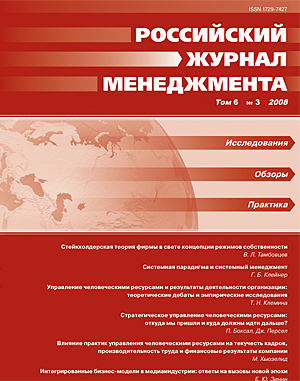Стейкхолдерская теория фирмы в свете концепции режимов собственности
Аннотация
Статья посвящена анализу попыток обосновать положения стейкхолдерской теории фирмы и принципы стейкхолдерского менеджмента с позиций теории прав собственности. Показано, что эти попытки являются некорректными, так как исходят из произвольных трактовок ряда категорий данной теории. Предложена трактовка стейкхолдерской теории фирмы, базирующаяся на понятии «режим собственности», и охарактеризованы последствия для стейкхолдерской теории, вытекающие из такого подхода.
Ключевые слова:
стейкхолдерская теория фирмы, права собственности, режимы собственности
Скачивания
Библиографические ссылки
REFERENCES IN LATIN ALPHABET
Загрузки
Опубликован
Как цитировать
Выпуск
Раздел
Лицензия
Статьи журнала «Российский журнал менеджмента» находятся в открытом доступе и распространяются в соответствии с условиями Лицензионного Договора с Санкт-Петербургским государственным университетом, который бесплатно предоставляет авторам неограниченное распространение и самостоятельное архивирование.





